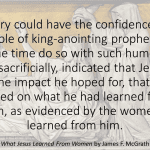I finally had the opportunity to begin listening to Kristin Du Mez’s book Jesus and John Wayne on the same day a student introduced me to a song about American Christian culture, “John Deere, John Cougar, and John 3:16.”
Four Johns. Only one biblical and he is last, and represented by a verse so often taken out of context, and featured often on t-shirts and bumper stickers. That is very interestingly a thread that connects the book and the song. Both draw our attention to the fact that there is an American Christian culture that is created, reinforced, and promoted through commercial means. Entertainment in the form of songs and movies. Merchandise in the form of books, kitsch, and accessories. These were quite consciously developed to not merely promote but literally sell Americans a vision of Christianity and more specifically Christian manhood. A lot more people are talking about biblical womanhood (which isn’t biblical, at least in the sense that it claims to be). Manhood also needs attention, since it has historically been treated as the default that requires no discussion, just like whiteness has been ignored as a racial identity, so much so that many white people are bristling and resisting as attention is brought to bear on its character as constructed culture and identity, rather than a default category that can be ignored.
John Wayne gets a mention in the song as well and so he is himself a thread that runs through this.
Christian t-shirts, Contemporary Christian Music, VeggieTales, televangelists, and even the Christian bookstores that see these items as well as countless bookmarks, posters, knickknacks, and of course Bibles galore, all these things have become so familiar that we can forget just how new they are. Not quite as new as Fox News as the substitute pastor and authority for conservative Evangelicals, but not so much older as to have anything to do with “historic Christianity.”
Nondenominational Evangelicalism has been so effective at cultivating its brand that it has become the default place to turn for many things, from news soundbites speaking on behalf of Christianity to what worship and sermons are “supposed to” look and sound like. We see the impact of this on campuses. Organizations like Campus Crusade (rebranded as “Cru” in response to it being pointed out that the Crusades are not a positive moment in the history of Christianity they ought to be looking back to as defining their aims and ethos) have become the go-to default for those seeking to connect with other Christians, even if they are mainline Protestants or even Roman Catholics. As a result, conservative Evangelical culture has permeated into all these more mainstream forms of Christianity, so much so that the absence of these traits is felt to be at best “Christianity lite” and at worst not really Christianity at all.
It is perhaps ironic that what the classic street corner preacher couldn’t do by proclaiming the gospel (as their variety of conservative Evangelicalism defined it), marketing and merchandising have managed to accomplish by stealth. It is to the credit of Du Mez and others that they are asking about the implications of this. One would think that, when this history is told, it would be obvious that at the very least it cannot be assumed to be a good thing. But when CCM, Christian cartoons, Fox News, televangelists, and all the other elements of the conservative Evangelical brand are woven into the fabric of your life, anything that pulls at those threads and threatens to unravel it can be experienced as an existential threat.
That something can be so recent and yet be regarded as the absolute truth, the only faith some have ever known, challenges the very heart of what conservativism in all its forms claims and proclaims. That is why it is important that this story be told, and that everyone who participates in this modern variety of Christian subculture as well as its detractors become aware not only of its manifestations in the present but its history.
Just as maleness and whiteness need to be recognized as identities that are not a colorless default, so too American conservative Evangelicalism is not a generic default, but on the contrary, a very distinctive and specific historical manifestation among many others. Making sure that is not ignored may be the best, most helpful, and ultimately most important thing we can do for white male-dominated Evangelical Christianity in the United States.
Of related interest:
A Conversation with Kristin Du Mez About Jesus and John Wayne
The Revealer has an article on God and masculinity
It’s time to rethink American churches














